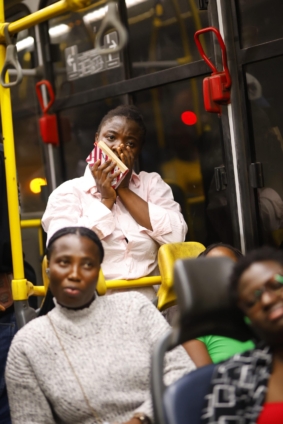In a bold fusion of creativity and innovation, Ghana has achieved a world first. The country launched the first commercial mobile theatre production on Saturday, July 26, 2025, making global theatre history.
That evening, an Ayalolo bus in Accra transformed into a moving stage for Kelewele Junction, a powerful live performance by Agape Arts Productions (AAP). The show ran at 4:00 PM, 6:00 PM, and 8:00 PM—each filled to capacity. Audiences experienced a gripping, emotionally charged performance that redefined traditional theatre.

What began as a regular bus ride quickly became an intense emotional journey. Characters revealed deep secrets and unspoken struggles. A casual conversation soon spiraled into raw confessions. The plot uncovered trauma, betrayal, guilt, survival, and an urgent search for redemption.
Each character represented a slice of Ghana’s social reality. The cast included a falsely accused delivery rider, a disgraced pastor consumed by greed, a whistleblower punished for doing right, a teenager jailed for defending herself, and a betrayed wife navigating a flawed justice system.

The 90-minute journey wasn’t just theatrical—it was symbolic. The bus departed from the National Theatre and passed through key sites in Accra. These included the Ministries, Ako Adjei Interchange, Independence Square, Kwame Nkrumah Memorial Park, and Jubilee House. Eventually, the bus returned via Oxford Street to the National Theatre. The city’s landscape served as a living backdrop for the unfolding stories.
After the final performance, AAP’s Creative Director, Francis Jeremy Afizie, explained the concept.
“A bus carries people, their baggage, and their destinations. This story does the same. We wanted to bring hidden lives into public spaces—into daily commutes—so they couldn’t be ignored.”
Kelewele Junction boldly tackled issues like sexual abuse, prison conditions, stigma, injustice, and mental health. With sharp dialogue and moments of dark humor, the show delivered powerful social commentary. It blurred the line between audience and performer. Passengers were not mere spectators; they became part of the narrative, enclosed in the same space as the characters.
Audience reactions were powerful. Some viewers cried. Others applauded mid-performance. Many sat in stunned silence. One attendee said:
“This was the most intimate and confronting performance I’ve ever experienced. Every tear, every pause felt personal.”
The production removed the usual distance between the stage and the audience. In doing so, it achieved something rare—real, shared empathy.
Although other mobile theatre formats exist globally, Kelewele Junction appears to be the first live drama staged on a moving city bus as a commercial production. It’s also the first of its kind in both Ghana and Africa.
Looking ahead, AAP plans to expand the project. They are considering a national tour to make theatre more mobile and accessible. Their aim is clear: bring compelling stories directly to communities—through their streets, their challenges, and their voices.
In the end, Kelewele Junction was not just a play. It was a moving conversation about pain, truth, justice, and healing. More importantly, it proved that Ghanaian theatre is not only evolving—it’s on the move.

